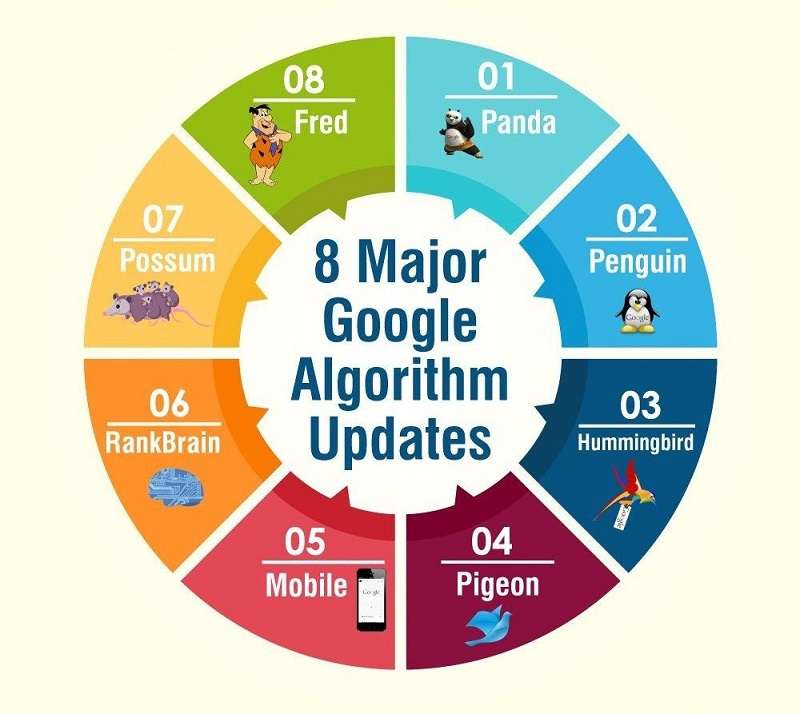Introduction: –
Google is the undisputed leader in the broad field of search engines. Google’s algorithms play a critical part in deciding search engine results page (SERP) ranks, with billions of searches made every day. Google constantly adjusts its algorithms to maintain fairness, accuracy, and relevancy in order to provide the best possible search experience. In this article, we will look at the important Google algorithms and analyze the most recent Google SEO adjustments.
Google Algorithms: –
Google PageRank: Larry Page and Sergey brim invented Google’s first algorithm, PageRank, in 1996. It transformed how search engines ranked webpages. PageRank gives each webpage a numerical value based on the amount and quality of backlinks it receives. The higher the PageRank, the greater the authority of the webpage.
Google Panda: Google Panda, which was introduced in 2011, aims to reward websites with high-quality, original material while penalizing those with thin or duplicate content. Panda imposed a new bar of content quality on webmasters, forcing them to focus on providing meaningful and unique content in order to maintain or enhance their rankings.
Google Penguin: Google Penguin was introduced in 2012 to address web spam and manipulative link building practices. Penguin targeted websites that employed black hat SEO practices including as keyword stuffing, link schemes, and inappropriate link building. It emphasized the significance of establishing organic and natural connections.
Google Hummingbird: Hummingbird, which was introduced in 2013, aims to improve Google’s comprehension of search queries and give more relevant results. It was more concerned with understanding the intent behind the search than with matching terms. Hummingbird cleared the path for semantic search to take off, as well as the importance of user intent in SEO.
Google Pigeon: Pigeon, which debuted in 2014, sought to improve local search results. It improved Google’s capacity to give accurate local search results by taking into account criteria such as location, distance, and prominence. Pigeon has a tremendous impact on local SEO techniques, emphasizing the necessity of local relevancy.
Google Mobile-Friendly Update: Google launched the Mobile-Friendly Update in 2015 in response to the growing popularity of mobile devices. Websites that are optimized for mobile devices rank higher, whereas those that are not optimized for mobile devices rank lower. The relevance of responsive design and mobile usability was emphasized in this upgrade.
Read Google Analytics 4-https://digitalsparrow.co/google-analytics-4-ga4-migration-guide/
Google Rank Brain: Rank Brain is a 2015 artificial intelligence (AI) programme that assists Google in better understanding complex and ambiguous search queries. It interprets search intent using machine learning to offer more accurate search results. Rank Brain emphasized the significance of relevancy and user experience.

Latest Google SEO Updates:
Google Core Updates: Google routinely releases core upgrades aimed at improving search results and ranks. These changes are vast in scope and have an impact on the broader search landscape. Website rankings may fluctuate due to fundamental modifications, and it is critical to monitor and adapt to any changes.
Google BERT: Bidirectional Encoder Representations from Transformers (BERT) is an AI method that enhances Google’s natural language processing. BERT, which was introduced in 2019, focuses on understanding the context and meaning of search queries, resulting in more accurate and relevant search results.
Google Page Experience Update: The Page Experience Update, which will be launched in 2021, will include new user experience measurements as ranking considerations. Core Web Vitals, which comprise measurements like page loading speed, interaction, and visual stability, now have an impact on rankings. This update emphasizes the importance of creating a smooth and engaging user experience.
Google Passage Ranking: Google announced the launch of Passage Ranking in 2020, which allows the search engine to rank specific portions inside web pages. Google may discover and rank individual paragraphs that contain the most relevant information for specific queries rather than ranking a complete page. The necessity of detailed and targeted information is emphasized in this update.
Google Product Reviews Update: The Product Reviews Update, which will be implemented in 2021, aims to reward websites that give in-depth and honest product reviews. Rankings improved for websites with high-quality product review content. This update emphasizes the value of reliable and informed product reviews.
expert SEO services 2024-https://startupadvice.in/improve-your-marketing-activities-with-expert-seo-services-2024/
Conclusion:
Google’s algorithms are continually developing in order to provide better search results and improve the user experience. From the early days of PageRank to the most recent upgrades like BERT, Page Experience, and Passage Ranking, Google has been refining its algorithms. As SEO specialists and website owners, it is critical to stay informed about these adjustments and adapt techniques to line with Google’s shifting algorithms. Websites should strive for higher results in the ever-changing search market by focusing on providing valuable content, optimizing for user experience, and following Google’s standards.


Pingback: The Digital Marketing Blueprint: Building Your Online Presence. – Digital Sparrow
Your article helped me a lot, is there any more related content? Thanks!
Can you be more specific about the content of your article? After reading it, I still have some doubts. Hope you can help me.
I don’t think the title of your article matches the content lol. Just kidding, mainly because I had some doubts after reading the article.